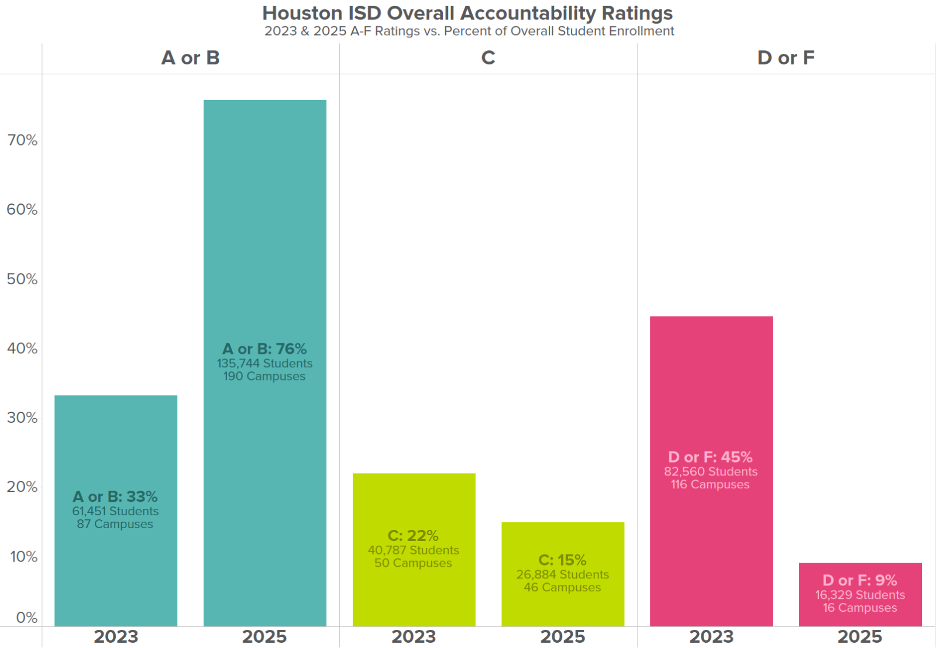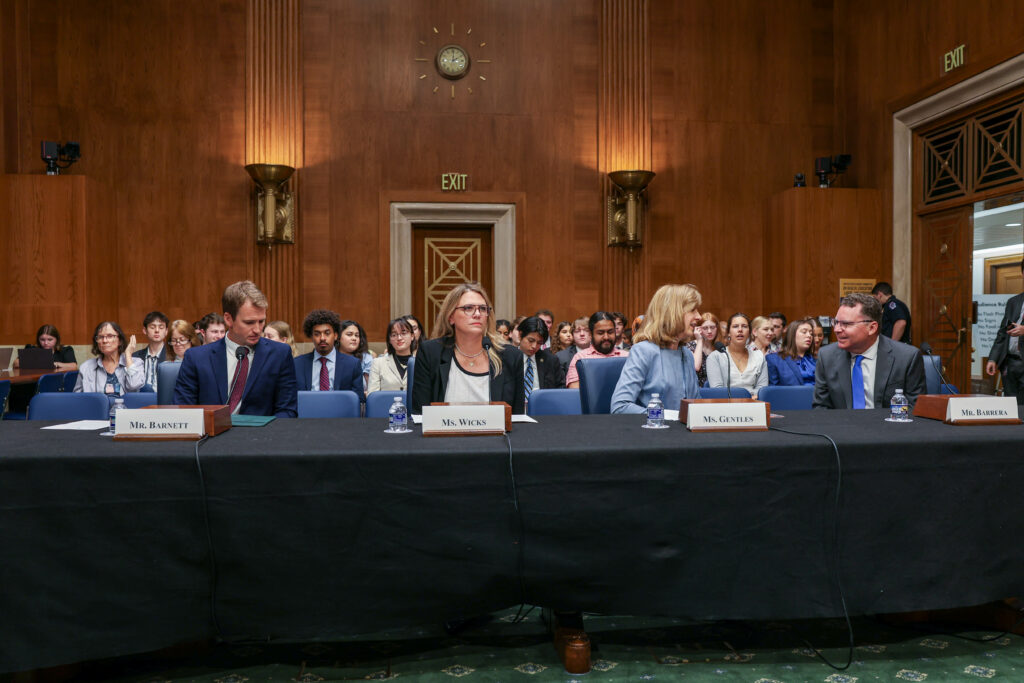Welcome to the education newsletter from the George W. Bush Institute. Here, we share a tightly curated monthly snapshot of our perspectives as well as the voices and ideas that shape the way we think about education today.
We dig into the big topics that are Bush Institute priorities – including literacy, accountability, student success, and pathways after high school – with the urgency they deserve.
If you’re new to the Bush Institute, we are a nonpartisan institution advancing the timeless values of freedom, accountability, opportunity and compassion. We believe education isn’t just a pathway to opportunity; it’s also the foundation of a strong, free society. When every child has access to a high-quality education, they’re prepared to thrive as citizens and people.
Thanks for reading along – and if this was forwarded to you, please let me know if you would like to be added to our distribution list.
Figure of the month
0% Zero F-Rated Schools in Houston ISD
In one of the most significant academic turnarounds in our nation’s history, Houston ISD (HISD), the largest school district in Texas, has seen extraordinary gains in school performance based on 2025 Texas A-F Accountability Ratings.
- Zero campuses received an F rating in 2025, down from 54 campuses in 2023
- 190 campuses (75%) earned an A or B rating, more than double the 87 campuses (34%) two years ago.
These gains come in the wake of a 2023 state intervention by the Texas Education Agency (TEA).
“ZIP code is no longer destiny in HISD,” HISD Superintendent Mike Miles said.
These improvements show the power of strong accountability systems, strategic investment, and a commitment to results-driven reform. HISD’s success could offer proof points for other states and districts.

Source: Good Reason Houston
Measurement matters
- On September 9, the National Assessment of Educational Progress (NAEP) released 2024 scores for its national assessment of math and reading skills among 12th graders across the country. The results paint an alarming picture of graduate readiness. Only 35% of students are proficient in reading and 22% in math, and just 35% of 12th graders are academically prepared for college. Former Secretary of Education, Margaret Spellings, who now leads the Bipartisan Policy Center, described the results as “an economic emergency that threatens our work force and national competitiveness.”
- For 4th and 8th grade students, Louisiana, Mississippi, Alabama, and Tennessee showed striking gains in the recent NAEP data, in what Education Next executive editor Frederick Hess calls the Southern Surge. Hess credits the impressive results to bold reforms passed by the states to improve literacy and teacher support.
- In a piece for The 74, I emphasize the importance of upholding the federal requirement for statewide annual assessments. This critical backstop protects states from powerful special-interest groups seeking to eliminate the transparent information about student achievement that state tests provide. Without transparency, parents, teachers, and policymakers won’t be able to see whether students are truly learning.
The right kind of flexibility
- On July 29, the U.S. Department of Education released new guidance outlining flexibility options for states under the Every Student Succeeds Act (ESSA).
- Dale Chu of the Fordham Institute argues ESSA flexibility should be used to improve how student learning is measured – not as an excuse for states to abolish testing systems. Responding to Oklahoma Superintendent Ryan Walters’ proposal to eliminate statewide reading and math exams, Chu warns that this move would fragment the system by eliminating uniform data within states and reduce transparency for parents and policymakers.
Bush Institute Insights
The Science of Reading works. It’s time we use it.
A strong democracy and a robust economy require that America’s children are on track in reading. This was the core message that Anne Wicks, the Don Evans Family Managing Director of Opportunity and Democracy at the Bush Institute, delivered last month in her testimony on literacy before the Senate Subcommittee on Education and the American Family Committee on Health, Education, Labor, and Pensions (HELP).

In her remarks, Wicks drew on her perspective as both a parent and education advocate to highlight the alarming decline in reading scores across the country and call for the adoption of instruction grounded in the Science of Reading, an extensive body of research about how our brains learn to read.
Wicks testified that states should anchor their reading policies and practices on five key areas:
- Strengthening teacher preparation programs
- Providing ongoing training and coaching for current teachers
- Ensuring access to high-quality instructional materials
- Screening and intervening early for students who need extra support
- Monitoring outcomes through comprehensive assessment systems, including statewide summative tests
Wicks also stressed the importance of maintaining federal requirements for annual statewide assessments and state accountability systems both critical for identifying underperforming schools and ensuring all students receive a high-quality education. Finally, she emphasized the need for sustained investment in literacy research to continue improving outcomes for all learners.
























